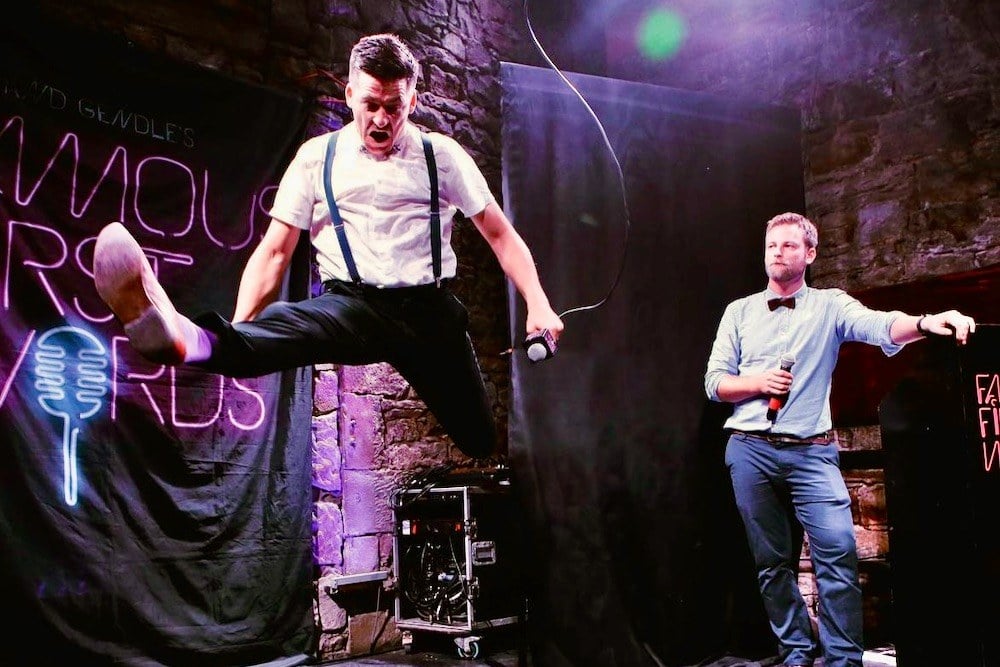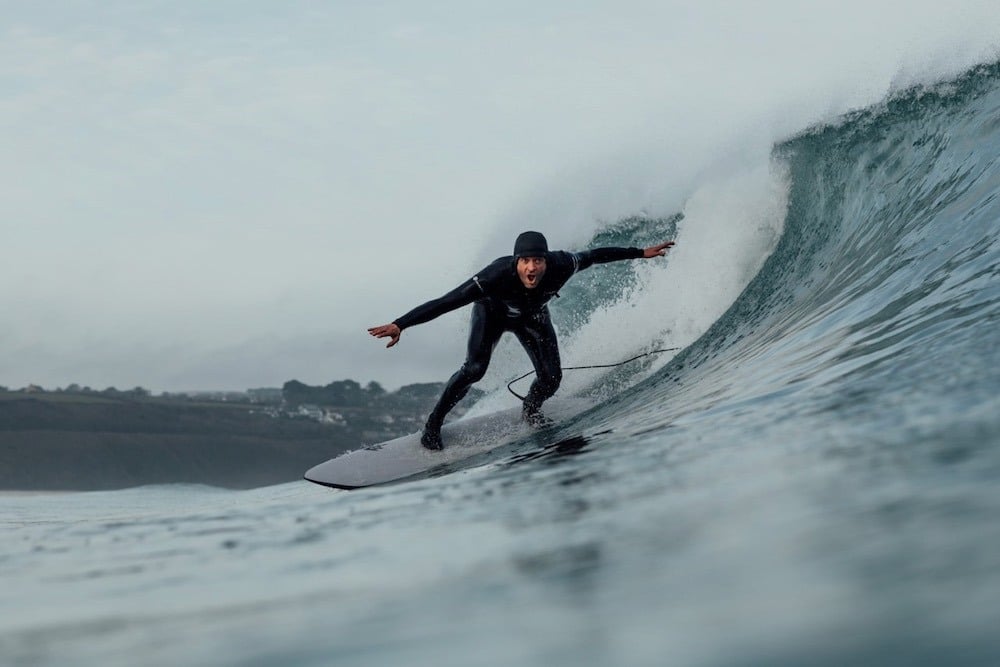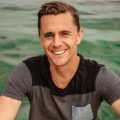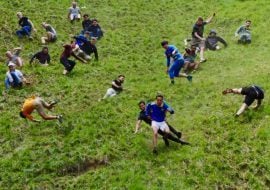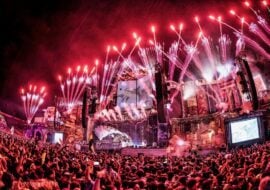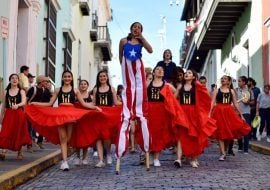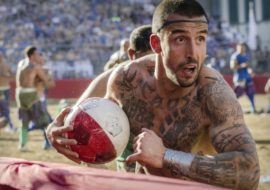Storytelling: Sal Masekela


Episode 5: Podcast with Sal Masekela, a Storyteller, TV host, Red Bull Presenter and former Commentator for X Games, FIFA and Vice
In this episode Oli Russell-Cowan chats to US TV host, commentator, musician, actor, journalist, producer, entrepreneur and action sports enthusiast Sal Masekela. Sal is best known for his work presenting the Summer and Winter X Games for 13 years as well as being the host for the Red Bull Signature Series. He’s reported on the 2010 FIFA World Cup in South Africa, and hosted E!’s Daily 10 and was the executive producer on the hit documentary series VICE World of Sports.
In their conversation Sal dives deep on storytelling and how he started out before commentating was really a thing. He has so many great stories to tell from witnessing Tony Hawk’s 900 on top of the vert, Travis Pastrana’s Double Backflip to Jake Brown’s Skateboard Big Air Crash.
The main takeaway of the chat was the art of storytelling is built on relationships and knowledge of the sport the athletes perform. This podcast demonstrates that you can have a conversation 7,000 miles away and have this commonality: the passion. The passion for life.
“It’s everyone’s personal responsibility to figure out how to grow, how to actually grow and be better.”
Listen to the podcast:
Dive in and listen to this episode on Apple Podcast and Spotify.
Read the transcript:
Rad Season: Hi guys, it’s Oli from Rad Season and we’re here with US TV host, producer, musician, actor, and massive action sports fan and voice Sal Masekela.
Sal, thanks for coming on the show man.
Sal: No worries, Oli. Hello everybody who decided to join us. Thanks for reaching out man.
Oli: Whereabouts are you at the moment?
Sal: I am in Venice Beach, California and I’m on day 78 of lockdown which has been slowly evolving here in the last few weeks. The beaches have been back open for surfing here in Los Angeles for the last two weeks.
That’s been a gift and definitely an appreciation. After being out of the ocean for two months just for me it was a huge show. I rebuilt my relationship with surfing during lockdown and as soon as lockdown was over I was like, okay, we’re back in the water heavy, whether the waves are good or not.
Oli: That’s cool. Is surfing limited to a certain area like your local breaks?
Sal: It kind of varies from town to town, in and around Southern California. For instance, here in Los Angeles all of the state parking lots are still closed.
So you have to navigate and find certain areas that you can park in if you know the neighborhoods to surf.
The goal was to be able to stop massive throngs from coming to the beach and it being congregated. So it’s still the rule in most areas that you can use the beach for exercise, but not for hanging out and lounging and sprawling.
It kind of varies from town to town. Here, the electric bike salesmen are killing it, because everyone’s like, oh, the bike with racks now, so I can go surf.
It’s really been a trip.
I’m 40 minutes north of Huntington Beach. The whole time that we couldn’t surf here in LA, surfing was still open in Huntington Beach.
So, it was a trip because you’re like, oh, man, I think I want to just get my car and go down there. But, you know, you’re kind of conflicted as to I wouldn’t be stoked if everyone and their mother were coming to my town. So I just chose, you know what I’m going to act in solidarity and just wait and be patient. Other people, you know, made different choices, but that was just kind of what resonated best for me.
Oli: How did this all begin? How did you get into surfing because you grew up in New York, right?
Sal: My family moved to Southern California when I was 16 from the east coast. So it was sort of an uprooting from a specific type of culture that was multicultural and rooted in music and the arts. My dad’s a jazz musician. That’s him over my shoulder.
I lived a different life. I played basketball. I was into gymnastics. I was always athletic. I was skateboarding a little bit. I started skateboarding at 14 but didn’t know anything about surfing.
My mother and stepfather moved to Carlsbad, California when I was 16. The town that I moved to for my high school was an epicenter for surfing.
It was crazy to go to a place where being on the basketball team or being on the football team were secondary to whether or not you practiced these other sports. Like if you skated and if you surfed in my school that made you cool. You were not cool if you played team sports for the most part. I was really drawn to the personal expression of it, you know, the fact that you could express yourself through movement.
I grew up in hip hop and breakdancing and to me, surfing looks like breakdancing on water. So I was drawn to it. I’ve happened to move to a place where everybody ripped and they’ve been surfing since they were little kids and a couple of kids took me under their wing. The first week that I moved to San Diego, I was almost 17 when I started surfing.
So the odds were definitely stacked against me. But the first time that I caught a wave on my stomach, I’ll never forget that feeling of being lifted up by this wave and getting in the way of water. It was like time sounded like something pulled out from the heavens and filled my soul. When I came up from the water after I felt like my life just went like this. This is where we go now. And it was all about building relationships with the ocean and I surfed in the water every day for the better part of 300 days, that first year for sure. Over 150 days in a row, at a certain point trying to play catch up, I would go to the school library and read all the back issues of surfer magazine, going back to like, the 70s and 60s, just so that I could learn and absorb everything about the culture. It was fascinating to me, I was like, there’s not only this thing, like the practice of doing it, but it comes with all this history and culture and community you know like it’s Hawaiian roots, etc.
“I was addicted man. It really changed the direction of my life.”
Transworld Skateboarding and Snowboarding Magazine
Sal: When I graduated from high school. I didn’t have any desire to go to college. My parents were like, what do you mean, I was like, I just want to get better at this thing. So I took odd jobs and I surfed my brains out. I started snowboarding six months after I started surfing and you know skateboarding, surfing and snowboarding just kind of took over my life.
At about 21 I got a job at Transworld Skateboarding and Snowboarding magazine as a receptionist intern. That’s sort of what began me on this path. I finally found a group of people. I found a place where I wasn’t gonna get fired.
I did so many other jobs for wanting to continue to play, like to play and grow in this thing. That’s really where my life shifted.
Oli: Where did it go from interning at Transworld to being involved with actual sports events and then and then commentating what happened there?
Sal: Well, I got into the industry at a beautiful time in the early 90s. The only people who cared about skating, surfing and snowboarding were the people who did it for the most part.
If you didn’t do it, if you dressed like it and you didn’t do it, you got called out, like you weren’t cool. It was a very small industry of like-minded people. People figured out pretty early on that. This kid’s really passionate about it. I think people saw that I was an extrovert and I was very social.
I’d grown up acting in theater and making and playing music. I was creative and expressive and people caught that vibe. I went from being a receptionist to them putting me on the phones to call skate shops to sell products.
I get on the phone with people, just talk shit and build all these friendships. I had this big book of all the skate, surf shops and snowboard shops in America. It was my job to sell these Transworld skateboarding and snowboarding videos to the shops as well as Transworld swag and merch like the hats and beanies and T-shirts. I would cold-call these shops up.
That’s really what helped me build a real understanding of the landscape of this community, outside of just my town, and learning the nuances of what it meant to people in all these other different places. How their areas work, etc.
It was pre-social media. That’s how you communicated you had to build relationships on the phone. That was a huge difference for me that that gave me a whole new skill set because a lot of times brands would come in to talk to advertisers etc.
They’d asked me what was going on. I had all the intel on what was really going on in the market, because I was talking to the kids in all these different regions. That helped me build relationships with people from these different brands.

Planet Earth
I got a job at Planet Earth skateboards with Chris Miller, who was one of my heroes, my idol.
He brought me in to sell skateboards. I had a reputation selling at Transworld. I went to Planet Earth and I started selling skateboards on the phone there.
Chris was also a surfer. I helped him get into snowboarding. So we started planning out snowboarding out of where I took my relationships from what I did at Transworld to help build the team, and recruit athletes.
Then I became a team manager at Planet Earth and Rhythm Skateboards. So I’m at all the different events anyway. Now because of my job, and then I have a sales background, so I’m able to go and take the team to the shops. I really had learned to navigate and long story short, you know, in those early days of events, no one was really covering them on television. And so the idea of there being a commentator didn’t really exist. We all took turns talking shit on the mic.
I just got a reputation for never shutting up. I’m making the audience laugh, I would make up fake BIOS about dudes who are skating, surfing, whatever. And people started calling and be like, Hey, we heard you killed it at such and such demo. Will you come and do our local contests? We’ll give you like $50 store credit.
Yeah, sure, no problem. I’ll come to talk shit all day. That led to someone calling you from a local snowboard contest be like, Hey, we heard you killed it for such and such. ‘Can you come up to do our contest at Snow Summit?’ We’ll give you two free lift tickets and a hotel.
‘I’m definitely there’. Like, you know, it wasn’t even about money at the time. It was just about being able to get rad perks to continue to do this thing. I would go on from Planet Earth to do some work at Reebok when they started this shoe division called ‘Box’ and I was a team and marketing guy there, and that pushed me even further into the landscape.
We’re now managing BMX riders, skateboarders, snowboarders, surfers, and I’m flying around all those different events. And again, it’s just building and using relationships to move forward.
I would also still be announcing at a lot of these events that I was at. I would get on the mic and do a guest spot. People be like, ‘Oh, that’s that guy that we saw at the tradeshow’. So I had this little side reputation. But it wasn’t a career.
Alphanumeric clothing
No one was giving me money. Then, you know, brands would call me and be like, Hey, can you come in? Like, can you come and be the MC of our Christmas party? We’ll give you a bunch of clothes that are cool. So you know, that’s how my relationship with Quiksilver started. It was very, very organic. Then, in 1998, my friends and I started a brand called Alphanumeric clothing.
We wanted to do an almost urban version of what Volcom was. At the time most of what was communicated as far as culture in the landscape of action sports was from a very blond haired blue eyed punk rock perspective. There were us, young people of color, that, you know, we just didn’t see anything that represented what we look like in any of these brands. We were into punk rock music, you know, but we were also very much into hip hop. It was like, why can’t we do a brand that sort of is a reflection of all of that.
My friend Alyasha Owerka-Moore and Omar Campbell, a few others got together. Alyasha was an incredible designer and skateboarder found some funding for us and we started this brand called Alphanumeric. It was right around that time that people have seen that Madison Avenue had really started to pay attention to action sports culture and see that there’s a goldmine here from a wall street perspective. You started to see all of the ‘extreme’. Everything was extreme, you know, like the extreme games and now you got Burger King has got their extreme burgers and it was a sort of an instant bastardization of the culture.
They jumped on the culture and be like, see, ‘We’re cool. We’re down with extreme.’ Of course none of us ever called ourselves extreme. So you’re just cringing, like, what is this? People were putting, you know, went from just seeing your favorite riders in video parts and in magazines and now you can see them on some public access television shows. Now you can see them on MTV and ESPN.
MTV sports and music festivals

The first really big break for me were the MTV sports and music festivals.
MTV was doing these sports music festivals. A friend of mine was working doing some production there. He told them you need to get this guy. This guy could actually make you guys look legitimate instead of just having your DJs saying shit, but not understanding what’s going on. That was my first big break. I was like co-hosting the MTV sports and music festivals alongside Carson Daly. And my job was to make Carson Daly not look bad.
He handled the music and I handled the shred and we sort of did this back and forth and that was my big break and people started paying attention. There was a public access style show called Planet X. That brought me on to interview people. And again, you’re interviewing your friends. So you’re at an event they hand you a mic like what’s up and you just talk and shit. Are we done? Cool. Go to the bar.
Noone wasn’t even getting money for it. But the MTV thing was really the big break and then ESPN.
ESPN and the X Games

I was with my team and Alphanumeric at the break at the Vans Triple Crown of Snowboarding in Breckenridge, Colorado. I was there with my athletes at the end of the first day of the contest. And I get a tap on my shoulder in the bar. And I turn around and this guy goes, excuse me. You’re Sal Masekela, Yes.
My name is Phil Orleans. I’m the executive producer of snowboarding for the X Games, and I’m looking for you. I stood up in my bar stool in the middle now you got it post contest, raging and I was like, whoever put this fucker up to this all you guys very, very funny.
I just assumed my friends were fucking with me. I sat back down, I laughed at the dude and I went back to drink with my friends. Tap Tap on my shoulder again. And now he has a business card in his hand. It’s not like something that you’d be just made up at kinkos this is like really nice card stock it was in Boston like red leaf, ESPN raised and it says executive producer of snowboarding for the X Games.
I was like, ‘Oh, I’m sorry.’ said, Can we walk and long story short, we bought a six-pack, left the bar and went out into the lobby. This is at the hotel. X Games was two years/ three years old at that point, and they were hard to watch like it was pretty cheesy.
As much as you were stoked to see the sports you love on television, the way it was being presented was not representative of how we would present the culture. So something that you tolerated, but you weren’t really stoked up. they said, we’re looking for people from within the community to be broadcasters and storytellers and we think that you could be one of those people.
I said thanks, but no thanks. It does not appeal to me and I went back home. I told everybody at work the next day that this guy came up to me wanting me to be on X Games. I wouldn’t, as I told blew him off and they’re like, what the fuck?
What are you doing? You could actually be a part of actually helping the story tell like, legitimately like, dude. What are you doing?
Fortunately, he called me later that week to see if I changed my mind to try and convince me and I said, Alright, I’ll give it a go. And two weeks later, I’m in Crescent View, Colorado sideline reporter interviewing all of my friends as they come down from the runs in the halfpipe and big air. That’s what literally changed my whole life.
Oli: You’re friends with these guys anyway, right?
Sal: At that point, I’ve been in the industry for about nine years. I worked in every division and area of how brands work from sales to team to management, which is all athlete development, you know. Managing the riders that you sponsor, so I had to be at all of the events.
I had been doing the announcing as a live announcer to the crowds. So I knew every single athlete that knew all the nuances of who they were.
It just made for a perfect transition. For the riders, it was the first time on national television, like they were coming in, at the end of their run and could talk to someone who actually knew what they were talking about and knew them. So it made them more comfortable in the interview.
It just took a different feel, then some football or baseball guy who’s asking them a question that doesn’t have any relevance to what they just did. I think over the course of the X Games they recognize that this cocky kid who doesn’t know anything about journalism or being a broadcaster may have some potential. Let’s see if we can school him. That really began what I call a 13 year paid television broadcasting education at the very highest level at ESPN.
Yeah, man, it literally changed my life. Within a year of that for X game a year and a half. I left my company and devoted myself to this thing that somehow I’m still doing 20 years later.
Oli: That’s awesome. It’s going to be the 25th anniversary of X Games in a couple of weeks. You’ve been doing it for 13 years. You must have some stories. Is there any kind of anything that really stands out from your time at the X Games?
Sal: There’s so many. It’s interesting, yesterday a crew came here to my house and we did a social distancing interview outside in front of my house in my little outside patio area. It was all about the best stories for this 25-year thing that ESPN is doing. It was the first time that I sat and really reflected in a really long time since I left in 2013.
Tony Hawk’s 900
Sal: There’s just so many, you know, I was standing on top of the vert when Tony Hawk did the 900. I was there at that moment. I was in the crowd at the bottom, you know, holding him up with a microphone in one hand and helping to hold him up with the other.
When that shock was heard around the world. It was such a powerful moment because that needed to happen to a specific person that would have the ability to truly capitalize on it. It was also the moment that it happened. It was a Friday night in primetime on ESPN in America in 1999.
People viewing, just the totality of content viewing options were so more limited and focused on just a few things in those days. ESPN would be one of the places that you would be posted up at home with your homies, drinking beers, watching the game or whatever. Those were your options. ESPN was on in every single bar in America. It was Friday Night in America. So everybody was in those sports bars and ESPN choosing to let Tony keep going after the contest was over, to try and make it.
I think it was like 17 or 18 attempts and his recovery between each attempt. That drama that builds and builds and they decide you know what, we’re going to not cut Sports Center. We’re going to stay here at skateboarding’s best trick to see if Tony Hawk can make this. That makes the whole world of people who are watching ESPN be like, ‘Huh, this must be a big deal if ESPN is showing it.’
Sure enough, it happened and when it happened everybody in the world saw that became the thing that everybody did you see that? Did you see what that guy did?
“Suddenly, people who never cared about skateboarding before were like fucking Tony Hawk man, that guy’s the man.”
He’s on all the talk shows. He chooses to hold the door open for the entire culture, and be like, hey, it’s pretty sweet over here. You guys come on in with me. Let’s go. And I think all of action sports across the landscape, all the different disciplines benefited from that moment because now suddenly, he’s being talked about in the same vein as Michael Jordan.
Any great mainstream athlete that people have been celebrating now, Tony Hawk’s name is there. He needed to be the person to do that. Because his mind always thought about capitalizing, you know, and from all the way back from the 80’s he was savvy when it came to marketing.
He’s a weird curious nerd who always was about technology. So, you know, it makes sense that two years later he comes out with Tony Hawk’s Pro Skater and changes the world. So that was just an incredible thing to have been a part of.
Travis Pastrana’s Double Backflip
Sal: To witness Travis Pastrana’s double backflip was a massive moment in 2006. To witness it was another one of those things that suddenly puts us on the stage amongst the most iconic things that have happened in sports, not just action sports.
Jake Brown’s Skateboard Big Air Crash
Sal: The famous Jake Brown skateboarding big air crash. He somehow lands in the flat bottom, falls almost 50 feet from the air and doesn’t die. You know, it was another one of those moments where people are like, what are these guys made of? These are superheroes,
Shawn White

To be there for the entirety of Shaun White from being a little kid. I was there with Sean from the time he was six or seven years old. The cute kid that everyone enjoyed hanging around to when I remember the years when he was 13 or 14 now he’s not so cute anymore. He’s taking money out of the mouths of dudes who are trying to feed their kids with.
It was very interesting to watch the way the attitude towards him changed very quickly. He should have won X Games, gold. There was a year he got double silver in Park and Superpipe that he should have won, for sure. I don’t think they wanted to give it to him. Sean is one of those hyper-focused ultra-competitive people like you saw in the Michael Jordan documentary. I believe that like that Michael Jordan documentary was a classic example of a certain type of mentality that needs an elite skill set.
Oli: Like Kelly Slater, right?
Sal: You mean that guy, Kelly over my shoulder.
Yeah, absolutely that person. Nyjah Huston has it. There’s just a certain thing for those people at that level where it’s like, I’m going to get up and I’m going to figure out how to piss excellence every day. If that gets in the way of your life, it’s not really my problem. I’m here to push this thing as far as I can take it.
To witness that, and then Sean’s complete total dominance. And then as if that wasn’t enough for him to take this thing that people thought, Oh, it’s cool that Sean skates, but he can’t compete at the highest level in skateboarding. That he’s not really one of us at this highest level. Shawn was like really, hold my beer. He comes into vert at X Games and he dominates like he becomes so important to vert skating competitively at the X Games that when Shaun White after just dominance and winning his three goals is like, you know what? I’m gonna go back to focusing on snowboarding. Everybody stopped caring about vert. That’s how big of a fucking deal this dude was and is.
It was fascinating to be able to be there and I had the privilege of commentating not just his snowboard runs but I was commentating skateboarding as well so I got to be able to marry all of it. Those years at that level of storytelling was a blast.
Bob Burnquist next to perfect run in 2001 in Philadelphia was a special one to call. There are just endless moments.
When surfing came to the X Games for three years. We went and did the team event in Puerto Escondido in Mexico for three years in a row. Hey, we’re gonna fly you down to Puerto Escondido for three weeks so that we can shoot surfing.
You know, it’s like the best of the best of pro surfing men and women coming and being part of it. Yeah man, it was all time. Too many moments to recount.
Red Bull Series
Oli: Then you went on to do the Red Bull series?
Sal: So yeah, leaving ESPN was a tough decision because it was so much of my identity. People saw me as the X Games guy and the longest job I ever had in my life, 13 years.
Oli: What was the transition after X Games?
Sal: I left ESPN and went to Red Bull to be a brand ambassador and to host the Red Bull Series. But the decision was mine. I left ESPN and they expected me to stay. But how do I say this?
They no longer saw fit to compensate me in the manner of where I felt they were giving me my due.
They came with a lot of restrictions as to being able to work and do things in other places. I loved hosting the X Games, but I knew that there was more that I wanted to do. It just felt like the right time.
No one enjoys a person who’s well-compensated and bitter at his job. No one likes that person. You don’t like working with that person in your job. And I could see that if I stayed and took that deal, I was going to be unhappy.
I was going to be that person with the chip on his shoulder. Television is a team sport. You know, everybody plays their part. I didn’t want to walk around and be that guy. So I was like, Okay, there’s gonna be a problem here so it’s probably time for me to go.
I called a friend at Red Bull. I was really stoked on all the events that Red Bull was doing. And I was like, X Games is fun, but it’s sort of a pop tent circus where everybody comes to this thing, right? Performs their sports in the best way as possible, but don’t really have an opportunity to showcase their individual cultures.
My roots were in events and the cultures of each sport. And I saw that what Red Bull was doing, I was like, Oh, wow. They’re figuring out ways to give these athletes opportunities to do the things that they do. They’d been dreaming of doing but maybe don’t have the platform to do so. Like:
“You want to go to space? Yeah, we’ll send you to space.”
I just thought to myself, this shit’s rad. Also, they don’t have a me. I wonder if they are looking for a me, maybe someone who could help contextualize and be a part of elevating the storytelling.
So I just called a friend over there and he was like, you would leave ESPN to come here? Yeah, let’s talk.
That’s how that came to fruition. It was a dream come true. You know, I never thought that I’d be able to make an upwards transit, a lateral or upwards transition from ESPN because it’s the worldwide leader in sports. Then suddenly, instead of just like these two events a year and doing programming to support these two events a year. Now I get to be in the mix at the premier events within all of the different sports and cultures like Red Bull Rampage.
Red Bull Rampage

Sal: I went to the first Red Bull Rampage in 2014 and I just remember getting out to Zion into the backcountry and just standing there looking up at the course and being like, wait.
People are gonna ride down this on bikes. What, what if they die?
So my first question is like, What don’t you like, there’s no way this can be a thing. Those guys were really humbling. They welcomed me and educated me about the culture.
I started spending time in Whistler. Going to Crankworx and next thing you know people are putting bikes underneath me and taking me and teaching me how to ride. Going and riding the parks up there and I just fell in love with it. Going to that event every year has been amazing.
Every year it’s just been like the anticipation. Fingers crossed we will run Red Bull Rampage this year. We still don’t know. But that is the next level of pushing your sport forward and the precision necessary to execute. It’s a zero room for error game. Being able to somehow add creativity to sending yourself 80 feet off of a cliff of rocks and dirt or a property crazy gap that if you miss you’re going to get impaled by strange rock formations 100 feet below you.
It’s a really cool culture. I’ve really enjoyed doing that event.
Red Bull Music and Sal’s World
Oli: You were involved in some of Red Bull’s music events as well?
Sal: That was really fun for Red Bull to recognize, like okay this guy actually also has a huge passion for music and we’re really all about music. We don’t need to go get another person, we can just use Sal. So for the six years up until last summer you know we did the festival series all summer here in America. We did Lollapalooza, Bonnaroo, Austin City Limits.
We would do four festivals a summer. They built me my own set called Sal’s World. All the artists would come to Sal’s World and I get to have these great conversations with emerging artists and legends. Before or after their set, they come and hang out for 10 minutes or so and just shoot the shit and talk music and get to watch some of the greatest bands in the world.
Alekasam
Sal: It was a blast to be able to go and do events. Go to the Volcom Pipe Pro go and do Rampage and then spend the summer just doing music was really really amazing. I got to play with my band. I have a band called Alekasam which is massive Masekela backward.
I got to play Bonnaroo as part of that series. I’m hosting the live broadcast for Red Bull. Then my band gets booked to play Bonnaroo. The two are not related. Red Bull were like, ‘Okay, no problem. We’ll work around you.’
Yeah, really, really cool and special. So it’s been a fun relationship. I’m lucky, you know, we’ll be working with each other through at least 2022.
Oli: You grew up traveling with your dad, Hugh Masekela who was one of the biggest jazz musicians in South Africa. Now not being able to go away, what are you looking forward to most when you can get that out?
Sal: You know this is the longest that I’ve been home in two decades. I’ve never had the opportunity to actually build a sense of home. At first, it was rather startling. But in the last six weeks, I’ve really let go of what my past lifestyle was.
I’ve honored it. I’m grateful for it. I have incredible memories but that life doesn’t exist anymore for any of us. So it’s really been about being present with now figuring out how to pivot.
I’m working on creating and storytelling a little bit more of the journey, it’s taking the time to sort of smell the flowers and be like, ‘oh, wow, that was a run.’
I’m working on a memoir. I’m launching a podcast in two weeks called ‘What Shapes Us’ that has been put off and finally, I have no excuse, but too so as you can see, but I’ve got them ready to go.
I’ve been working on that. The Burton US Open of Snowboarding just got canceled for 2021 a couple of days ago. That’s one of my premier events. So that was very sobering.
We don’t know if Red Bull Rampage is going to happen this year. I haven’t heard anything yet. On the Volcom Pipe Pro, though I feel optimistic about that one.
We’re gonna pivot and figure out how to create content at home. Be patient and as things come back, and we get opportunities to travel again we will travel again. I do want to go places. I really really want to go on a surf trip badly.
Oli: Last time we spoke about surfing in Nicaragua.
Sal: I’ve been watching my friends down in Nika. My buddy who lives down there and he’s just been posting himself getting the most ridiculous waves ever.
My priority right now is to be patient where I’m at and make sure my family is taken care of. This thing has affected people in horrific manners and continues to affect people in horrific ways.
Here in America, especially it’s disproportionately affecting people of color and the poor and acting as a black light on a bunch of broken systems. Within our country, we were all so busy that we could conveniently ignore it. It’s relentlessly shining a light on huge areas of injustice. Socially and economically across the landscape, you see what, what we’re dealing with when it comes to police brutality and typically in the manner in which it’s propagated against people of color here.
Because of lockdown and because of the situation, everyone’s sort of forced to have to pay attention. It just feels like a potentially pivotal time for an actual sustainable change you hoped for because I didn’t know when this thing started, the last thing that I thought was that people would come out more divided and more entrenched in their belief systems than when they went in. I literally thought fuck we’re all in this in the same thing. Perhaps this is going to engender a little bit more communication and empathy and commonality of who we are, no matter who you decide to pray to, or who you sleep with, or any of the various teams that people try to pick to make themselves more important.
It’s been sad and really scary to watch the ways in which the powers that be and different people with different agendas will try to capitalize on actually getting people to be more entrenched in their ideologies. And it’s like after you’re gone, no one’s gonna be like, man, he did such a great job like me. He did such a great job believing that his way of thinking was the best, like how did you make people feel?
That’s what’s so beautiful about this culture, you know, and the fact that like you and I can have a conversation from 7,000 miles away and have this commonality in the passion for the thing. The passion for life. As far as like, where do we go from? Where do I go from here? I’ve got no clue. I’m trying to create and build forums for discussion and storytelling that hopefully can serve a little bit of a bigger purpose outside of just the things that I love, which is doing events to do a little bit more for the culture.
Stoked.org

Oli: You’re one of the cofounders of Stoked organization as well and are involved in a number of charities. Are there any projects that you’ve started doing?
Sal: The one thing that we’re doing with Stoked is really having to learn to pivot. Our mentoring organization is so rooted in hands-on work with kids. We take kids and we take them snowboarding, we take them surfing, skating, we teach them actually out how to build skateboards with their hands and all that stuff.
So we’ve been pivoting and learning how to utilize this type of communication system to provide opportunities for kids to still feel like they can have a community. It’s about making kids feel empowered and safe and have a sense of community so that they can pursue the challenging aspects of growing up. Especially when our kids are really great smart kids that come from already challenging situations at home.
Now we’re in a situation like this where whatever economic strains that families were experiencing under ‘normal conditions’ are now further amplified or dysfunctions that they had in the homes where they could question feeling safe, those things are amplified. So we’re just really working to pivot to be able to take care of our kids in the present and modify the manner in which we mentor.
Hopefully also keep people interested in still wanting to support us.
It’s crazy the way all of that just changed overnight. It was Friday the 13th of March here in America.
I pay attention across the pond, as well. But yeah, it just seems like in all these places like our systems are really being challenged. There’s a huge opportunity for people across the board. I feel like no one chose to come into this. Everyone’s got their different feelings, there’s an immense amount of information being hurled in various directions. Some of it pointedly subversive to try and motivate agendas. So everyone’s like, I don’t know what’s real.
What the facts are and this is this some sort of a scam or the ‘plandemic or no this is where the data lies, etc. and this thing is you. I found it even amongst friends that people are divided. We’re all in a challenging situation here. Well, guess what I’m trying to get out is none of us have the choice of how we walked into this because everyone just found their lives being turned upside down.
But we all have the choice of how we individually walk out of this. In other words, like the adjustments and what we’re learning about ourselves from being forced to spend so much time with ourselves. I think we all have an opportunity to be far better versions and more realistic versions. What are the differences between our wants and our needs?
I was saying to a friend yesterday I know that in areas of my life are a bunch of easily accessible luxuries that became regularities, that in turn my mind created as necessities. Now after eight weeks of not having them you realize none of that shit was even a real thing. Those weren’t necessities. For a lot of people, it’s the first time that they’ve ever been challenged or told no or had to even regulate to think about how they behave in certain spaces.
For a lot of people from marginalized people. They’re like, Well, welcome to what a lot of has been for my entire life. I’m sorry that it took a pandemic for you to experience it, but like, this is what lives have always been.
So I guess what I’m trying to say is that there’s potential for us being better as a whole. Despite the immense amounts of loss and pain that people are experiencing.
It’s everyone’s personal responsibility to figure out how to grow, how to actually grow and be better from this if we’re still here. You haven’t lost your life from this. It’s your responsibility to figure out how to be better. To use the rearview mirror as a point of reference, but not where you’re trying to get back to because that shit doesn’t exist anymore. I don’t care who you are. It’s a photo album.
That’s it.
Oli: If anyone wants to get hold of you, what’s the best way?
Blow me up. Light up my DM bro on Instagram and Twitter. I don’t use Facebook at all because I think it’s a horrible place, of all the social media places. The level of toxicity on Facebook, I left like three or four years ago. But yeah, Instagram, Twitter. Twitter’s also a horrible place but I enjoy it.
Yeah, those are the places you can find me to send me a note. Once a week I really try to look at all the DM’s and people send me usually really smart questions or conversations they want to have. I’m always open to have a dialogue with people and to learn from people and create opportunities for exchange and growth.
Oli: That’s awesome. Thanks Sal.
Sal: Oli it’s always a pleasure, sir.
Watch the video:
Photo Credit: Sal Masakela, Stoked Mentoring
Missed the last episodes? Check them out!
Episode 2: Bog Snorkeling World Champion – Neil Rutter
Episode 3: Spanish Festivals – Wade Gravy
Episode 4: Weird Sports – Sol Neelman
Last updated on Nov 6, 2020Have you subscribed to our Newsletter or Podcast? Listen to us on Apple Podcast and Spotify and follow us on Facebook, Instagram Twitter and YouTube.



